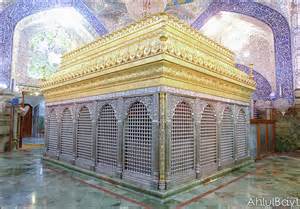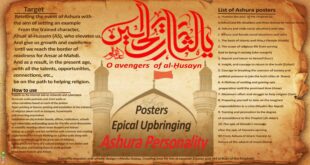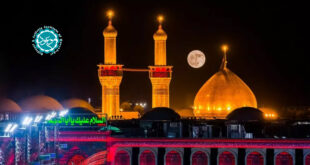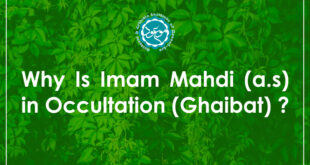Suppose for a minute that the martyrdom of Sayyid al-Shuhadā’ (‘a) was not voluntary. What about the actions of each of the martyrs of Karbalāwhich would surely entail death? There is no doubt that they preferred that the Imām (‘a) live a few hours more over their own life. Hence, each of them threw themselves into the maws of death to extend the Imām’s life.
This makes it clear that this criticism—that basically no person will voluntarily perform an action that they know is definitely dangerous—is unfounded.
In description of the Pharaoh and his people, God, the Exalted, states:
“And they denied the miracles and invitation of Moses (‘a) even though they were certain of their truth…”8
According to the Qur’an, the people of Pharaoh knew of their certain demise in the case that they continue to deny certainty and disbelieve. Even so, they still did what they did and were drowned.
Here also, it is obvious that the criticism asking how the Imām (‘a) can content himself with voluntarily surrendering himself to death depriving the human world of the blessings of his existence is completely baseless.
Because, as we have indicated, knowing of the importance of his martyrdom in relation to continuing his life, the Imām (‘a) preferred martyrdom. No Shī‘ah, rather no Muslim, and more precisely no reasonable human being should be ignorant of the awe-inspiring effects of the Husaynī martyrdom in the Muslim World, especially in the Shī‘ah World, throughout these nearly fourteen centuries.
Throughout the vast treasury of Islamic jurisprudence, the teachers of which are the lineage of the Prophet (S) as per the widely transmitted Hadīth al-Thaqalayn, there is no hadīth related from Sayyid al-Shuhadā’ (‘a).9 Indeed, some scholars are quoted to have said that only one hadīth has been found from him.
This is the product of ten years of Sayyid al-Shuhadā’s (‘a) Imamate! This clearly indicates that the incrimination ignited during the twenty year reign of Mu‘āwiyah, generated such a woeful situation for the Holy Prophet’s (S) family to the extent that the people turned away from Sayyid al-Shuhadā’ (‘a).
Now compare the benefits of the Imām’s (‘a) short life against the astonishing and enduring effects manifested in the Muslim World throughout the thirteen hundred years subsequent to his martyrdom, in order to understand the truth or untruth of the following disputation: why would the Imām (‘a) divest the Muslim World of his existential blessings with his martyrdom?
In addition to what has already been said regarding this issue, if there must be a criticism, it cannot relate to Sayyid al-Shuhadā’ (‘a) but to divine decree and pose the question: why should God, the Exalted, from whom the world must take benefit, decree martyrdom causing his servant’s blood to spill upon the earth?
Does this criticism—assuming that one does not understand or feel partial to the previous reply—have any response but to say that God, the Almighty, is absolutely Wise and performs nothing unwisely and without benefit?
Like His other decrees, the decree of the Imām’s (‘a) martyrdom is not without wisdom even assuming the case that we do not understand it and, even if we do direct this criticism towards the Imām (‘a), this same answer is relevant because the Imāms (‘a) are manifestations of God’s Wisdom and they will never perform an unwise or useless deed.
1. It literally means liege of the martyrs and refers to the third Imām, Husayn ibn ‘Alī. [trans.]
2. Sūrat al-Jinn 72:26-27.
3. This literally means the Guarded Tablet, which is a repository of all knowledge. [trans.]
4. This means that whatever the Ahl al-Bayt are satisfied with, God is satisfied with, because their will and satisfaction has faded into the will and satisfaction of God. [trans.]
5. Sūrat al-Baqarah 2:195.
6. Cited by Ālūsī in the 26th section of “Tafsīr-i Rūh al-Ma‘ānī”,p. 66, from “Tārīkh-i Ibn al-Wardī” and “Wāfī al-Wafiyyāt”.
7. In full Banī Hāshim, literally Children of Hāshim; he was an ancestor of the Prophet (S). Specifically, in this verse it refers to the Prophet and the Imāms. [trans.]
8. Sūrat al-Naml 27:14.
9. The Shī‘ahs cite narrations from Sayyid al-Shuhadā’ (‘a) in jurisprudential issues. However, they are narrations through other Imāms such as Imām al-Sādiq, Imām Mūsā ibn Ja‘far, and Imām al-Ridā (‘a). For instance:
That which I refuted were narrations that people other than the Imāms cited, showing consultation of the people.

 Mouood Mouood English Edition
Mouood Mouood English Edition



